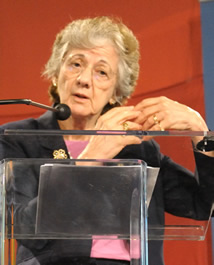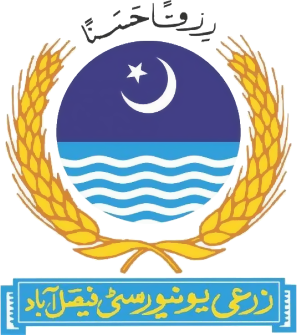Related Research Articles
Bonnie Lynn Bassler is an American molecular biologist; the Squibb Professor in Molecular Biology and chair of the Department of Molecular Biology at Princeton University; and a Howard Hughes Medical Institute Investigator. She has researched cell-to-cell chemical communication in bacteria and discovered key insights into the mechanism by which bacteria communicate, known as quorum sensing. She has contributed to the idea that disruption of chemical signaling can be used as an antimicrobial therapy.

Susan Lee Lindquist, ForMemRS was an American professor of biology at MIT specializing in molecular biology, particularly the protein folding problem within a family of molecules known as heat-shock proteins, and prions. Lindquist was a member and former director of the Whitehead Institute and was awarded the National Medal of Science in 2010.

Rita Rossi Colwell is an American environmental microbiologist and scientific administrator. Colwell holds degrees in bacteriology, genetics, and oceanography and studies infectious diseases. Colwell is the founder and Chair of CosmosID, a bioinformatics company. From 1998 to 2004, she was the 11th Director and 1st female Director of the National Science Foundation.

Carlos Juan Finlay was a Cuban epidemiologist recognized as a pioneer in the research of yellow fever, determining that it was transmitted through mosquitoes Aedes aegypti.

The University of the Punjab, also referred to as Punjab University, is a public, research, coeducational higher education institution located in Lahore, Pakistan. Punjab University is the oldest and largest public university in Pakistan.

The University of Agriculture (UAF) is a public research university in Faisalabad, Pakistan.

The Carlos J. Finlay Prize is a biennial scientific prize sponsored by the Government of Cuba and awarded since 1980 by the United Nations Educational, Scientific and Cultural Organization (UNESCO) to people or organizations for their outstanding contributions to microbiology and its applications. Winners receive a grant of $5,000 USD donated by the Government of Cuba and an Albert Einstein Silver Medal from UNESCO.

Pascale Cossart is a French bacteriologist who is affiliated with the Pasteur Institute of Paris. She is the foremost authority on Listeria monocytogenes, a deadly and common food-borne pathogen responsible for encephalitis, meningitis, bacteremia, gastroenteritis, and other diseases.

Elaine V. Fuchs is an American cell biologist famous for her work on the biology and molecular mechanisms of mammalian skin and skin diseases, who helped lead the modernization of dermatology. Fuchs pioneered reverse genetics approaches, which assess protein function first and then assess its role in development and disease. In particular, Fuchs researches skin stem cells and their production of hair and skin. She is an investigator at the Howard Hughes Medical Institute and the Rebecca C. Lancefield Professor of Mammalian Cell Biology and Development at The Rockefeller University.
Etienne Pays is a Belgian molecular biologist and professor at the Universite Libre de Bruxelles. His research interest is on trypanosomes.

Susana López Charretón is a Mexican virologist specialized in understanding the mechanisms of infection of rotavirus. López Charretón has led a research program as principal investigator at the Biotechnology Institute (UNAM) in Cuernavaca, Mexico for over 25 years.
Antonio Peña Díaz is a Mexican biochemist who received the Carlos J. Finlay Prize for Microbiology and chaired both the Mexican Academy of Sciences (1992–93) and the Mexican Society of Biochemistry (1981–83).
Anwar Nasim is a Pakistani molecular biologist and geneticist who was the president of Pakistan Academy of Sciences from 2015–2017. He currently resides in Toronto, Canada.
Archana Sharma was a renowned Indian botanist, cytogeneticist, cell biologist, and cytotoxicologist. Her widely recognized contributions include the study of speciation in vegetatively reproducing plants, induction of cell division in adult nuclei, the cause of polyteny in differentiated tissues in plants, cytotaxonomy of flowering plants, and the effect of arsenic in water.

The University of Haripur (UOH) (Urdu: جامعہ ہری پور) is a public university situated in Haripur, Khyber Pakhtunkhwa, Pakistan.
Pamela Soltis is an American botanist. She is a distinguished professor at the University of Florida, curator at the Florida Museum of Natural History, principal investigator of the Laboratory of Molecular Systematics and Evolutionary Genetics at the Florida Museum of Natural History, and founding director of the University of Florida Biodiversity Institute.

Emmanuelle Marie Charpentier is a French professor and researcher in microbiology, genetics, and biochemistry. As of 2015, she has been a director at the Max Planck Institute for Infection Biology in Berlin. In 2018, she founded an independent research institute, the Max Planck Unit for the Science of Pathogens. In 2020, Charpentier and American biochemist Jennifer Doudna of the University of California, Berkeley, were awarded the Nobel Prize in Chemistry "for the development of a method for genome editing". This was the first science Nobel Prize ever won by two women only.

Samir Kumar Saha is an eminent Bangladeshi microbiologist and public health expert. He is the professor, senior consultant and head of the department of Diagnostic Division of Microbiology at the Dhaka Shishu Hospital for children and also the executive director of The Child Health Research Foundation (CHRF) at the Bangladesh Institute of Child Health.
Khatijah Mohamad Yusoff is an Malaysian academician and a virologist. Her research on the Virulent Newcastle disease (NDV), a poultry virus has gained acknowledgement locally and globally. She received the UNESCO Carlos J. Finlay Prize for Microbiology in 2005.
References
- 1 2 3 "University of the Punjab - Prof. Dr. Shahida Hasnain". pu.edu.pk.
- ↑ "Four academics selected for research". The Express Tribune. November 26, 2010.
- ↑ Reporter, A. (October 21, 2017). "Punjab University professor wins Unesco prize". DAWN.COM.
- ↑ "Pakistan, Bangladesh scientists receive Carlos J. Finlay UNESCO Prize for Microbiology". www.thenews.com.pk.
This article needs additional or more specific categories .(July 2023) |